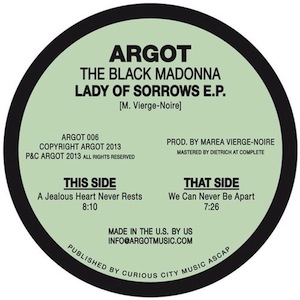The Black Madonna Lady of Sorrows EP
The Black Madonna‘s latest EP of rough-and-tumble disco is unexpectedly emotive. Fortified with acid lines […]

The Black Madonna‘s latest EP of rough-and-tumble disco is unexpectedly emotive. Fortified with acid lines and freighted with emotional baggage, the Chicago producer still makes sure the Lady of Sorrows EP’s bleeding heart isn’t too weighed down to strut. With a few records under her belt from labels such as Scotland’s Home Taping Is Killing Music and Chicago’s Stripped & Chewed, The Black Madonna specializes in a studied-yet-exuberant style that steers clear of polished nu-disco clichés. Looping, locked-in past efforts like “Alright This Morning” and “We Don’t Need No Music (Thank You Rahaan)” were as gritty and lived-in as pleather marinated in cigarette smoke. The tough realism of that sound opens up on this EP, which permits the digressions her other records kept at bay. The result is a record that charts a more vulnerable course over its two sides without foregoing the edge The Black Madonna has been honing on her previous few releases. Despite the titles’ strife-filled overtones, “A Jealous Heart Never Rests” and “We Can Never Be Apart” are peaceful, tender, and at times beautifully ADD.
The a-side opens on grave strings shot through with a feeling of loss. But reinforced by an assertive drum-and-clap hustle, the track quickly buoys its regret. A walking 303 line that rearranges itself into increasingly complicated anagrams also lends to the puttering, syrupy momentum. The producer lowers her guard even further on the b-side. “We Can Never Be Apart” begins on a similar note, but takes a less linear path—structurally, it twists and turns indecisively, but a sumptuously sad vibe holds it together. That sense of intimacy pushes this record to the forefront of her discography, and makes “We Can Never Be Apart” the most resonant thing she’s produced so far. At times, nu-disco seems to exist solely to make good on the old rockist arguments about soulless dance music, but The Black Madonna has a very different constitution. She’s preoccupied with how dance music connects with actual bodies—and, judging by the unexpected vulnerability of Lady of Sorrows, hearts.

